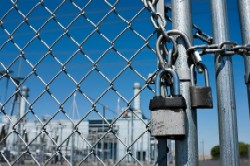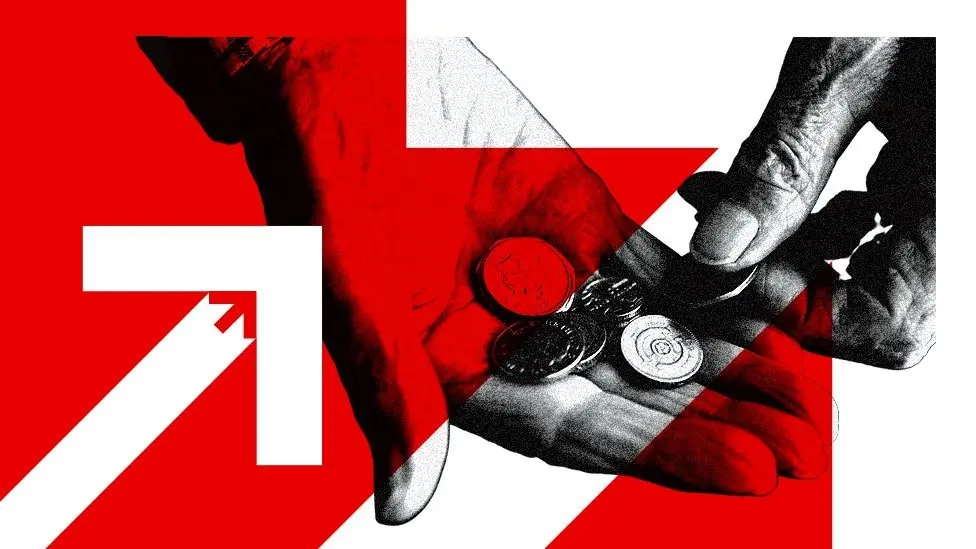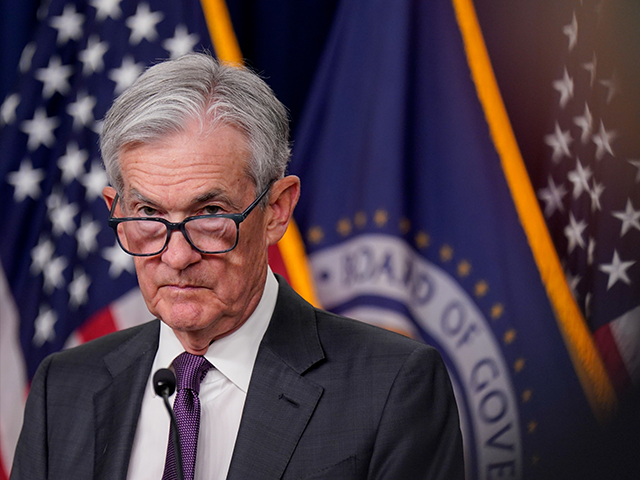from Al Jazeera English
We Are Being Told the Odds of a Recession Are Rising as Economic Conditions Deteriorate All Around Us
by Michael Snyder
The Economic Collapse Blog
 Is the U.S. economy headed for a recession? Nobody can deny that consumer confidence is plummeting, home sales are way down, mass layoffs are being conducted all over the nation, thousands of stores are closing, and a global trade war has erupted. Meanwhile, the Atlanta Fed’s GDPNow model is currently projecting that the U.S. economy will shrink at an annualized rate of 1.8 percent during the first quarter of 2025. Needless to say, none of these are good signs.
Is the U.S. economy headed for a recession? Nobody can deny that consumer confidence is plummeting, home sales are way down, mass layoffs are being conducted all over the nation, thousands of stores are closing, and a global trade war has erupted. Meanwhile, the Atlanta Fed’s GDPNow model is currently projecting that the U.S. economy will shrink at an annualized rate of 1.8 percent during the first quarter of 2025. Needless to say, none of these are good signs.
In recent weeks, the corporate media has been running lots of stories about how the odds of a recession are suddenly surging. Here is one example from NBC News…
Trade tensions have torn into the markets. With stocks sliding into correction territory in the last week, a question emerges: Is a recession next?
The Fed’s Backdoor QE
by James Rickards
Daily Reckoning
 On Monday, we offered readers the following forecast of what would happen at the FOMC meeting this week:
On Monday, we offered readers the following forecast of what would happen at the FOMC meeting this week:
On Wednesday, the Fed will continue its pause in interest rate cuts. That decision will leave the federal funds target unchanged at 4.50%. The Fed’s current rate lowering cycle began with a 0.50% rate cut on September 18, 2024, followed by additional rate cuts of 0.25% each on November 7 and December 18, 2024. The pause in cutting rates began at the Federal Reserve meeting on January 29, 2025. This pause is a reflection of the Fed’s concern about rising inflation and a desire to see additional data before deciding on its next move.
Here’s What Happened
The Fed did continue the pause in its cuts in the fed funds rate as we predicted. This kept the Fed’s target rate unchanged at 4.50%. The rate pause was widely expected. The Fed does not like to produce surprises if they can possibly avoid it. This is the no drama Fed.
The Inflationista Illuminati, Part 2
by John Mauldin
GoldSeek
 The theme among so many writers seems to be “vibe shift.” And indeed, there is a concern the economy is slowing and may even be in a recession. That is certainly what today’s writer and my friend, Danielle DiMartino Booth, points to in this second part of her data-driven inflation analysis, which I share below. She believes the mainstream media, both financial and otherwise, is missing the fact that inflation is going to come down faster than most analysts expect—including those at the Federal Reserve.
The theme among so many writers seems to be “vibe shift.” And indeed, there is a concern the economy is slowing and may even be in a recession. That is certainly what today’s writer and my friend, Danielle DiMartino Booth, points to in this second part of her data-driven inflation analysis, which I share below. She believes the mainstream media, both financial and otherwise, is missing the fact that inflation is going to come down faster than most analysts expect—including those at the Federal Reserve.
I have some comments but I will save them for the end of the letter. Let’s jump right in.
Treasury Yield Curve Re-Inverts with Sag in the Middle, as Government Swats Down 10-Year Yield. But Mortgage Rates Don’t Follow all the Way, Spread Widens
by Wolf Richter
Wolf Street
 Short-term Treasury yields of 6 months or less stay put above 4%.
Short-term Treasury yields of 6 months or less stay put above 4%.
The 10-year Treasury yield has careened lower from 4.77% on January 10 to 4.16% on March 3, and has since then wobbled a little higher to end at 4.26% on Friday, just a hair below the effective federal funds rate (EFFR) that the Fed targets with its short-term policy rates. This decline in the 10-year yield isn’t a coincident.
The government has been trying to push down, talk down, swat down, and wish down long-term Treasury yields to make funding in the economy for businesses and households less costly – the stated policy of Treasury Secretary Scott Bessent.
Key Events This Week: Tariff Talk, Core PCE, Confidence and Global PMIs
from Zero Hedge
It is the last full week before the April 2nd US tariff announcement, so expect lots of headlines on this. Indeed US equity futures are higher this morning on Friday’s Bloomberg story that tariffs will be more targeted than the worst fears. Outside of trade, DB’s Jim Reid notesthat inflation will take centre stage with the all-important US core PCE on Friday. Before that, UK and Australian inflation are out on Wednesday with flash French and Spanish CPI out on Friday, alongside Tokyo CPI.
In terms of other highlights, today’s global flash PMIs will be interesting. US and Europe bounced last month but since then the tariff rhetoric has aggressively stepped-up, but on the other hand Germany has reversed decades of fiscal conservatism. So, it’ll be interesting to see how the surveys respond to those developments.
790,000 Jobs, $160 Billion GDP: Shocking Costs Of Inflation Reduction Act Repeal
by Silvio Marcacci
Forbes
 In 2022, Hyundai announced it was investing $5.5 billion to build a “Metaplant” manufacturing electric vehicles and batteries in Bryan County, Georgia. It promised more than 3,500 good-paying jobs first building the massive manufacturing facility, then making electric vehicles that cut consumer bills by providing cheaper transportation choices.
In 2022, Hyundai announced it was investing $5.5 billion to build a “Metaplant” manufacturing electric vehicles and batteries in Bryan County, Georgia. It promised more than 3,500 good-paying jobs first building the massive manufacturing facility, then making electric vehicles that cut consumer bills by providing cheaper transportation choices.
“This is the largest investment in the state of Georgia’s history, one that will diversify and expand our economy while providing strong job opportunities for Georgians today and for generations to come,” said Congressman Buddy Carter (GA-1).
When the Metaplant opened in October 2024, months ahead of schedule, it started shipping Hyundai Ioniq 5 EVs, the fourth-best selling EV in America. It also started generating millions in salaries, tax revenue, and economic activity across Southeast Georgia.
Eggs: Staple Food, Index of Inflation and Touchstone of American Culture
Trump used their price as a campaign issue but has been unable to stop costs rising. Why do eggs matter so much?
by Adam Gabbatt
The Guardian
 As the Trump economy continues to perform with all the robustness and reliability of a Tesla Cybertruck, one thing, above anything else, has come to be seen as a measure of how the US is faring: the humble egg.
As the Trump economy continues to perform with all the robustness and reliability of a Tesla Cybertruck, one thing, above anything else, has come to be seen as a measure of how the US is faring: the humble egg.
The egg holds a uniquely central place in American culture, egg experts say, and the soaring price in recent months, largely due to a bird flu outbreak, has been discussed and debated across the country.
About 30 million chickens have been culled due to the disease, making a mockery of Donald Trump’s campaign trail promises to reduce grocery prices. Eggs cost 59% more in February compared with a year earlier, and while the price has declined in recent days, the government has predicted egg costs will inch back up. But the egg focus raises the question: why has the egg become the de facto barometer for economic success in the US?
UK Inflation Rate: How Quickly Are Prices Rising?
from BBC
 Prices in the UK rose by 3% in the 12 months to January, well above the Bank of England’s target.
Prices in the UK rose by 3% in the 12 months to January, well above the Bank of England’s target.
The Bank moves interest rates up and down to try to keep inflation at 2%, and has cut three times since August 2024.
When it announced the last cut in February, the Bank warned that it expected inflation to rise again in 2025.
What is inflation?
Inflation is the increase in the price of something over time.
For example, if a bottle of milk costs £1 but is £1.05 a year later, then annual milk inflation is 5%.
Continue Reading at BBC.com, Former home of child rapist, Jimmy Savile…
The Fed Isn’t Buying the Media’s Tariff Panic
by John Carney
Breitbart.com
 Powell Refuses to Take the Media’s Tariff Panic Bait
Powell Refuses to Take the Media’s Tariff Panic Bait
The financial press is hyperventilating about Trump’s tariffs, but the Federal Reserve’s latest Summary of Economic Projections (SEP) makes clear the central bank isn’t buying the panic.
Instead, the Fed’s view is that the inflationary impact of tariffs will be both transitory and relatively small. Fed Chairman Jerome Powell made it clear during his press conference that while the Fed sees tariffs as contributing to higher inflation projections, they are far from the dominant factor.
“A good part of it is coming from tariffs, but we’ll be working and so will other forecasters to try to find the best possible way to separate non-tariff inflation from tariff inflation,” Powell said.
Powell Flirts Again with a Dangerous Way to Describe Inflation: ‘Transitory’
by Jennifer Schonberger
Yahoo! Finance
![]() A fraught word resurfaced in the Federal Reserve’s lexicon again this week: “transitory.”
A fraught word resurfaced in the Federal Reserve’s lexicon again this week: “transitory.”
It came from Fed Chair Jerome Powell, who told reporters Wednesday his “base case” is that higher inflation stemming from President Trump’s tariffs will be “transitory” — reviving memories of how central bank policymakers talked about inflation during the early stages of the COVID-19 pandemic.
Because Fed officials expected pandemic-era inflation to be transitory, they argued there was no reason to raise rates aggressively — an expectation that turned out to be misguided as inflation rose to a four-decade high in 2022. The Fed eventually mounted the most aggressive campaign to bring inflation down since the 1970s.

